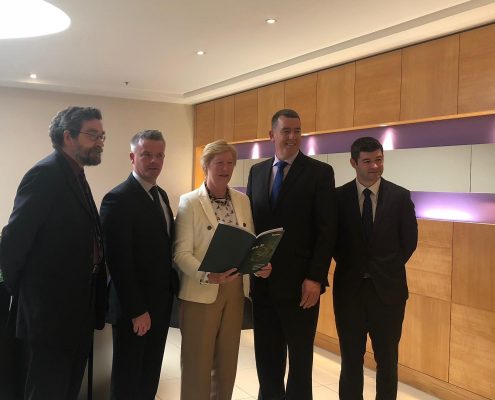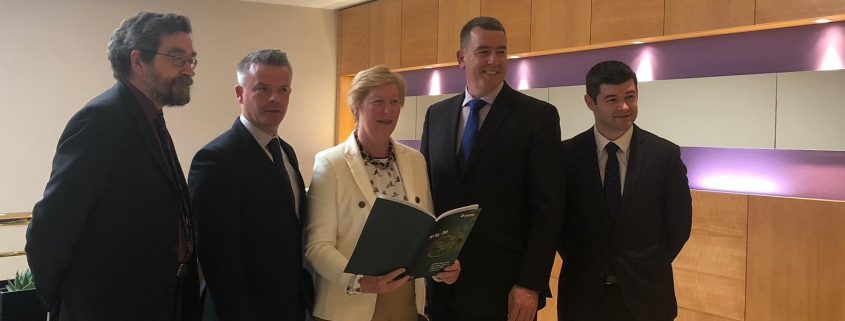Press Release Representing Renewable Energy Associations of Ireland
Eight organisations representing renewable energy in Ireland united today to call on Minister for Communications, Climate Action and Environment Denis Naughten TD to set a target to supply 70 per cent of electricity from renewables by 2030.
In June 2018 the European Union agreed that 32 per cent of the EU’s energy – across electricity, heat and transport – will come from renewables by 2030. Ireland’s share of that target will be negotiated with the EU in the coming months.
A comprehensive report from leading energy and utilities experts Baringa says it is technically possible and cost neutral to the consumer for Ireland to use renewable energy to supply 70 per cent of our electricity by 2030, which would go a long way towards reaching the EU target. A summary of the report can be found here.
It follows confirmation from the Climate Change Advisory Council in July that Ireland will miss its overall 2020 target for renewable energy, warnings from the Environmental Protection Agency highlighting the failure to reduce greenhouse gas emissions and comes as the International Panel on Climate Change meets in Korea.
In September the Joint Oireachtas Committee on Climate Action began meeting to respond to the calls from the Citizens’ Assembly earlier this year for Ireland to become a leader in tackling climate change.
Currently, approximately 30 per cent of Irish electricity comes from renewables and while Ireland will fall short of its overall 2020 target it is expected to still reach its 40 per cent electricity target. 
Speakers: Dr John Fitzgerald (Climate Change Advisory Council), Des O’Toole (IrBEA President),
Marie Donnelly (Former Directorate General for Energy), Michael McCarthy (CEO of ISEA), Dr David Connolly (CEO of IWEA)
Dr David Connolly, CEO of the Irish Wind Energy Association, said: “When Ireland’s renewable energy targets for 2030 are set we will be shaping our energy and climate action policies for a generation
“The evidence from the Baringa report is clear. An electricity system using 70 per cent renewable energy by 2030 is not only practical, it is – at a minimum – cost neutral for the consumer.
“With the right leadership we can be ambitious for Ireland’s energy future, for our role in the fight against climate change and show our determination to support the Paris Agreement.
“The renewable energy community is urging Minister Naughten to drive Irish energy policy, investment and jobs for the next decade by setting a 70 per cent target for renewable electricity.”
Michael McCarthy, CEO of the Irish Solar Energy Association, said: “Setting a 70 per cent target for renewable electricity by 2030 is essential if Ireland is to live up to the Taoiseach’s own stated position on the importance of climate change as a key policy priority.
“This is a unique opportunity for Ireland to lead by example across the EU, making best use of solar, wind and other renewable resources and facilitating the electrification of the heat and transport sectors. Increasing the renewable electricity target will lead to more clean energy production, more jobs, more local investment and a better environment.
“The cost of these renewable technologies and the cost of finance has never been lower, therefore, resulting in a lower cost of electricity for the consumer. ISEA believe solar energy can be a key contributor to the achievement of the 70 per cent target.”
Des O’Toole, President of the Irish Bioenergy Association, said: “We support the call for a 70 per cent target for renewable electricity by 2030 and we believe that the bioenergy sector will play a crucial role in delivering on this ambitious target.
“With the output from our domestic forests expected to double over the next 15 years, CHP utilising locally sourced biomass offers the potential to produce renewable electricity for large energy users and supports the sustainable growth of the forestry sector, which in turn will ensure continued economic vibrancy and employment across rural Ireland.”
Grattan Healy, Chairman of the Irish Wind Farmers Association, said: “Renewables are a key to the revitalisation of rural Ireland because they are by nature a dispersed resource which everyone can tap into, creating local employment and reducing imports nationally and locally of expensive and damaging fossil fuels.
“Setting a stretching but technically and economically feasible target of 70 per cent renewable electricity for 2030 would galvanise the preservation and growth of rural communities.”
Garry Connolly, President of Host in Ireland, which represents data hosting partners, said: “Ireland’s ability to become a leader in the renewable energy space will assist significantly in keeping Ireland in the top tier of Global Data Centre Clusters. Host In Ireland are in full support of a 70 percent renewable target in our mission to become as eco-friendly as our sister countries.”
Peter Duffy, President of the Irish Energy Storage Association, said: “The energy storage industry in Ireland is developing rapidly and will be well capable of supporting a 70 per cent renewable electricity target both in terms of facilitating the variability of renewable generation and also providing grid stability.”
Peter Coyle, Chairperson of the Marine Renewables Industry Association, representing the emerging marine energy technologies, said: “We welcome the challenging target set by the study for renewable sourced electricity. We envisage that ‘floating wind’ and wave energy technologies can play an important part in achieving this goal.”
Paddy Turnbull, Chairperson of Smart Grid Ireland, said: “Smart Grid Ireland fully endorses this push to achieve 70% renewables by 2030. Putting this target into our national policy will fully align Ireland with the worldwide consensus that that climate change is an imminent threat that can be addressed through the decarbonisation of the global energy system.
“Ireland is already a world leader in using renewables to supply the national electricity grid and the role of grid network is critical to the achievement of this strategic goal. There will be key benefits for the Irish economy as it will encourage innovation in renewable energy which will have long-term benefits for consumers.”
ENDS
Notes to Editor
In June 2018 the EU agreed to increase the share of renewables in energy to 32 per cent by 2030 and in December the Irish Government will publish its draft National Energy and Climate Plan (NECP).
This plan will set out Ireland’s 2030 renewable energy target and likely will, like the 2020 target, be broken down across the electricity, heat and transport sectors.
It is expected that Ireland will be one of two EU countries to miss our 2020 target of 16 per



